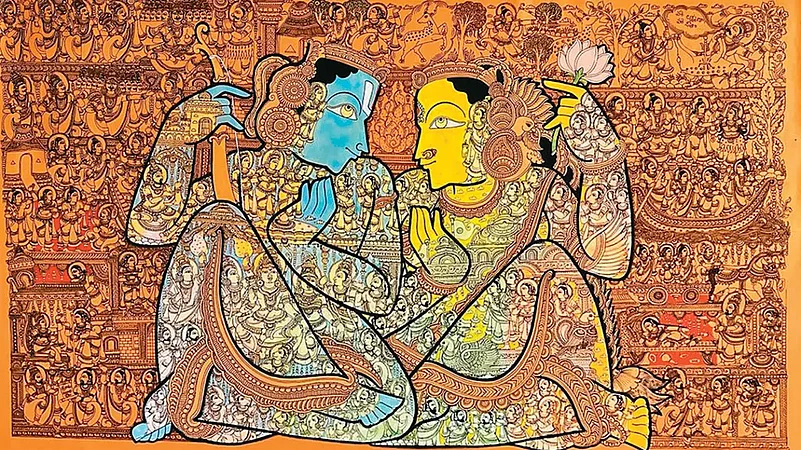One can often hear girls singing on their way to temples in Bihar, “Raja Dasharath jaisan sasur maangiley, Rani Kaushalya jaisan saas/Babu Lakshman jaisan devar maangiley, Purush maangiley Sri Ram, hey maa! (O mother, I ask for a father-in-law like King Dasharath, mother-in-law like Kaushalya, brother-in-law like Lakshman and a groom like Shri Ram).”
From the materialistic point of view, Sita’s life after marriage was not a happy one. She had to face family conspiracy, go into exile for 14 years, was abducted and had to remain Ravan’s captive for an entire year. Yet, our daughters have been asking for a groom like Ram since ages.
And that too in Mithila! Why? Because, the world doesn’t see Ram the way Mithila does. Mithila loved him so much that it forgot all about the struggles of its most famous daughter in her life.
ALSO READ: Who Is Ram And What Is His Story?
The world has a relationship of faith with Ram. Ayodhya is related to Ram owing to his birth. But Mithila’s relationship is of pure love.
He is a deity for the whole world, the Jagatpita (father of the world) and maryada purushottam. But for Mithila, he is still its most beloved paahun (son-in-law). Since the Treta Yug, when he came to Janakpur to get married to Siya (Sita), nothing has changed. Even today, elderly women of Mithila see Ram through the affectionate eyes of Sita’s foster mother Sunaina, as a dashing young man carrying a bow. To them, he is still a son-in-law. The daughters of Mithila can laugh the same way as Maithili girls laughed at the sight of an enraged Lakshman, back in those days. He is still a paahun (son-in-law) for them.
Describing Ram’s marriage in Ramcharitmanas, Tulsidas writes, “Jenvat dehi madhur dhuni gaari, lai lai naam purush aru nari! (Mithila’s women are calling members of King Dasharath’s family names, while sitting in King Janak’s courtyard).” This is the beauty of the world! It is natural for the women of Mithila to hurl abusive banter at King Dasharath and his family members, and yet nobody frowns. Far from it, they all smile. It may sound amazing, but for Janakpur, Dasharath is not an emperor but a samadhi.
ALSO READ: Who Is Ram? Defining The Enigma
This spontaneity is at the core of the culture. Ages after Ram and Sita got married, when Sant Rambhadracharyaji Maharaj recently went to Janakpur from Ayodhya, he was greeted by women with the same candour with which Mithila’s women had once treated Maharaja Dasharath. And the seer listened to them with a smile. Only Mithila has the right to abuse Ram’s relatives and home, because it is his in-laws’ place.
Until a few years ago, the elders of Mithila refrained from even drinking water in Ayodhya. Even today, many residents of Mithila do not do so, because, as per ancient custom, nobody eats or drinks at the daughter’s sasural.
And Siya, after all, is their dearest daughter! How can anyone drink water in her in-laws’ place? After her marriage to Ram, thousands of generations have come and gone, but Siya remains Mithila’s daughter. For King Janak, the Almighty himself became his son. It was the pinnacle of his fortune. But he did not retain this good fortune with himself and shared it with all of Janakpur. That’s why Ram is everyone’s paahun here.
Any man looks handsome at his wedding. The most beautiful form of Lord Rama was seen by Mithila when he arrived as bridegroom—to see which, Lord Indra had to open his thousand eyes; the Sun had to stop; and Lord Shiva had to come in person along with Goddess Parvati. It was Ayodhya’s misfortune that a conspiracy sent Ram to exile, but Mithila always kept him in their vision.
To them, Ram is part of their extended family, not a deity. Mithila’s residents can make fun of him or even hurl sweet abuses. They have a monopoly on such wonderful feelings for Ram.
(This appeared in the print edition as "Mithila’s Son-in-law")
(Views expressed are personal)
Sarvesh Tiwari Shrimukh is the author of the novels Parat and Punyapath

















